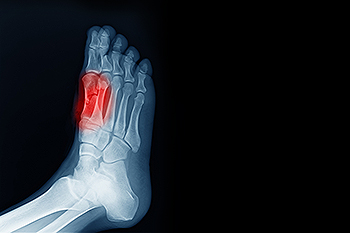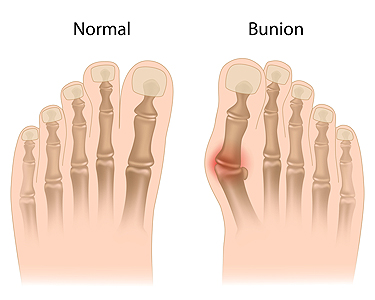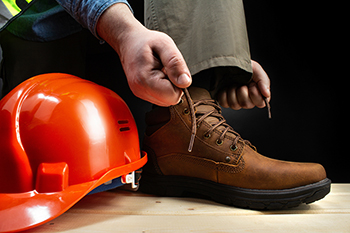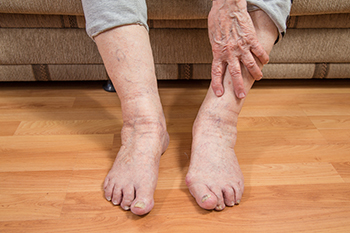Connect With Us
Blog
Items filtered by date: May 2022
Who Is Prone to Getting Sesamoiditis?

The two small bones in the ball of the foot under the joint of the big toe are referred to as the sesamoid bones. One is located on the outside of the foot, and the other is located closer to the center of the foot. Sesamoiditis occurs when the tissue that surrounds the sesamoid bones becomes inflamed and irritated. Sesamoiditis is considered to be a form of tendonitis, and can cause severe pain and discomfort. This generally happens from overuse and repeated pressure that is placed on the forefoot. The sesamoid bones absorb impact, and are responsible for helping the big toe move up and down during activity. Some of the symptoms that are associated with sesamoiditis can include foot pain that does not diminish, and the big toe may become stiff. People with increased chances of developing sesamoiditis include dancers, runners, and women who wear high heels. Effective treatment can begin with stopping the activity that caused this condition, resting the affected foot as often as possible, and possibly taping the big toe. If you have this ailment, it is strongly advised that you are under the care of a podiatrist who can help you with treatment options that are right for you.
Sesamoiditis is an unpleasant foot condition characterized by pain in the balls of the feet. If you think you’re struggling with sesamoiditis, contact Vivian C. Iwu, DPM of Choice Podiatry Center. Our doctor will treat your condition thoroughly and effectively.
Sesamoiditis
Sesamoiditis is a condition of the foot that affects the ball of the foot. It is more common in younger people than it is in older people. It can also occur with people who have begun a new exercise program, since their bodies are adjusting to the new physical regimen. Pain may also be caused by the inflammation of tendons surrounding the bones. It is important to seek treatment in its early stages because if you ignore the pain, this condition can lead to more serious problems such as severe irritation and bone fractures.
Causes of Sesamoiditis
- Sudden increase in activity
- Increase in physically strenuous movement without a proper warm up or build up
- Foot structure: those who have smaller, bonier feet or those with a high arch may be more susceptible
Treatment for sesamoiditis is non-invasive and simple. Doctors may recommend a strict rest period where the patient forgoes most physical activity. This will help give the patient time to heal their feet through limited activity. For serious cases, it is best to speak with your doctor to determine a treatment option that will help your specific needs.
If you have any questions please feel free to contact our office located in Marietta, GA . We offer the newest diagnostic and treatment technologies for all your foot and ankle needs.
Do Your Child's Feet Hurt?
Can Bunions Be Prevented?

Women are more prone to developing bunions than men. This may be a result of wearing high heels or shoes that do not have adequate room in the toe area. A bunion appears as a bony lump on the side of the big toe and is considered to be a foot deformity. This protrusion causes the bone in the big toe to gradually move toward the other toes and can produce pain and discomfort. People who develop bunions may eventually get osteoarthritis in the big toe, which can be the source of chronic pain. Additionally, the risk of getting a bunion may increase in patients who have short calf muscles or a shortened Achilles tendon, and medical conditions such as rheumatoid arthritis and flat feet. Bunions may be prevented by wearing shoes that are comfortable and flat. It may help to frequently walk barefoot, which may be beneficial in strengthening the muscles in the overall foot. If you have developed a bunion, it is strongly suggested that you speak with a podiatrist who can provide you with correct treatment options, which may include surgery for permanent removal.
If you are suffering from bunions, contact Vivian C. Iwu, DPM of Choice Podiatry Center. Our doctor can provide the care you need to keep you pain-free and on your feet.
What Is a Bunion?
A bunion is formed of swollen tissue or an enlargement of boney growth, usually located at the base joint of the toe that connects to the foot. The swelling occurs due to the bones in the big toe shifting inward, which impacts the other toes of the foot. This causes the area around the base of the big toe to become inflamed and painful.
Why Do Bunions Form?
Genetics – Susceptibility to bunions are often hereditary
Stress on the feet – Poorly fitted and uncomfortable footwear that places stress on feet, such as heels, can worsen existing bunions
How Are Bunions Diagnosed?
Doctors often perform two tests – blood tests and x-rays – when trying to diagnose bunions, especially in the early stages of development. Blood tests help determine if the foot pain is being caused by something else, such as arthritis, while x-rays provide a clear picture of your bone structure to your doctor.
How Are Bunions Treated?
- Refrain from wearing heels or similar shoes that cause discomfort
- Select wider shoes that can provide more comfort and reduce pain
- Anti-inflammatory and pain management drugs
- Orthotics or foot inserts
- Surgery
If you have any questions, please feel free to contact our office located in Marietta, GA . We offer the newest diagnostic and treatment technologies for all your foot care needs.
Foot Problems From Standing at Work

It is healthy to strike a good balance between sitting and standing at work throughout the day without having to do either excessively. However, certain professions require that a person be on their feet continually while at work which can cause a variety of foot and leg problems to develop. Heel pain, plantar fasciitis in particular, is a common foot condition for many people who stand at work all day. Having to absorb the body’s weight all day can overload and even tear the plantar fascia tissue on the sole of the feet. This can cause pain and inflammation in the heel, known as plantar fasciitis. Standing all day at work can also cause veins close to the skin’s surface to become enlarged, twisted, unsightly, and sometimes painful. This is known as varicose veins. These are just two common issues you may experience if you need to stand while working. If you are experiencing any pain or discomfort in your feet or legs on the job, make an appointment with a podiatrist. They can treat your condition and offer professional advice on how to lessen the negative impact you are putting on your feet while standing all day at work.
While working on the feet, it is important to take the proper care of them. For more information about working on your feet, contact Vivian C. Iwu, DPM from Choice Podiatry Center. Our doctor will treat your foot and ankle needs.
Working on Your Feet
Standing on your feet for long periods of time can cause stress and pain in your feet. Your whole body may experience change in terms of posture, back pain, bunions, callouses and or plantar warts. There are ways to avoid these conditions with proper foot care, smart choices and correct posture.
Positive Changes
Negative heeled shoe – Choosing this shoe type places the heel slightly lower than the ball of the foot. These are great for overall foot health. Find shoes that fit you correctly.
Go barefoot – Our feet were not designed to be enclosed for all hours of the day. Try to periodically expose your feet to air.
Eliminate Pain
Foot Exercises – Performing simple exercises, incorporating yoga and doing stretches are beneficial. This will allow increased blood flow to the area and muscles of the foot.
Achilles tendon – Stretching the foot out flat on the floor will relax the calf muscles and tendon. These exercises can be performed almost anywhere. Make sure you add these exercises to your daily regimen.
With a little bit of this information and knowing more about foot health, you will notice changes. Foot stretches and proper footwear will help with pain and prevent further issues.
If you have any questions please feel free to contact our office located in Marietta, GA . We offer the newest diagnostic and treatment technologies for all your foot and ankle needs.
Foot Care and Aging

As one ages, it is important that foot care be maintained as their feet have worked for them for a long time and are apt to suffer from some wear and tear. At the least, an elderly person’s feet tend to flatten, widen, and have less padding that leaves bones and joints more unstable. Seemingly small problems like ingrown toenails or a minor cut can result in a barrage of health conditions that can impact an older adult’s health and well-being. Having healthy feet helps seniors to remain mobile, independent, and upright. Essential to good foot care are keeping one’s feet clean, proper drying and moisturizing of feet, wearing well-fitting socks and shoes that do not rub or cause friction, trimming toenails straight across, and monitoring any developing sores. An elderly person who cannot do these things for themselves, can enlist the services of a podiatrist and through regular visits, keep their feet in tip-top shape, and prevent burgeoning problems from worsening.
If you need your feet checked, contact Vivian C. Iwu, DPM of Choice Podiatry Center. Our doctor will attend to all of your foot and ankle needs and provide you with quality treatment.
Geriatrics and Podiatry
When people age, some common issues that may occur are bone density loss, dry skin, poor circulation, and rough brittle nails. These issues may also affect your foot health if the necessary steps are not taken to alleviate the problems.
It is important to take care of your feet because feet that are injured or diseased can affect your overall health. Having painful feet hinders your ability to do daily activities or may decrease your willingness to do the things that you need to do.
Visiting Your Geriatrician
As we age, health problems become more likely, so it is essential to visit your doctor for check-ups to ensure that you are doing the best you can to take care of your health. It is recommended to check your feet frequently for any possible cuts, bruises, swelling, corns or any other irregularities.
Taking Care of Elderly Feet
Cracked or dry feet can be treated by applying moisturizer often. It is also important not to wear old socks because the older the sock is, the higher the possibility there will be that there is bacteria there. Wear fresh socks and make sure they fit properly.
Proper foot health means that you can have a more active lifestyle and you will not be bogged down by pain. Foot health also leads to good circulation, which is paramount for overall health.
If you have any questions, please feel free to contact our office located in Marietta, GA . We offer the newest diagnostic tools and technology to treat your foot and ankle needs.


